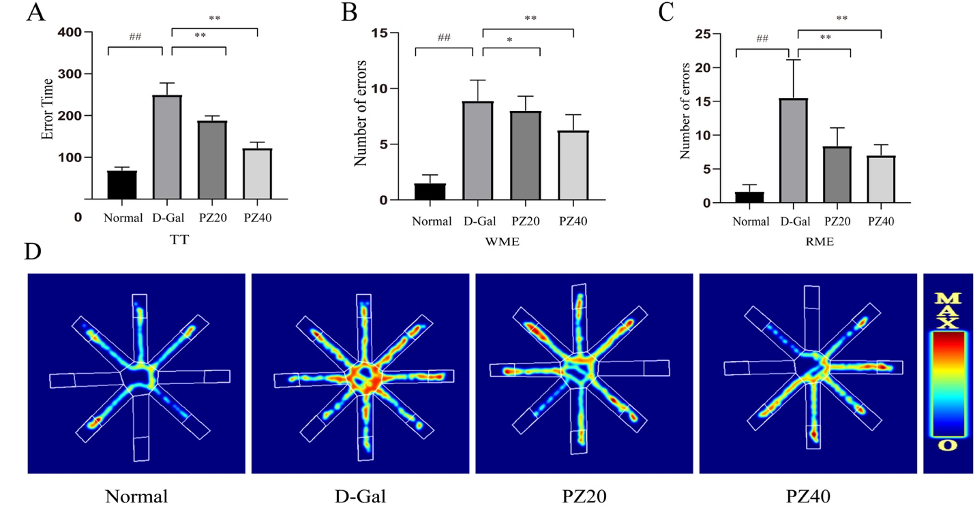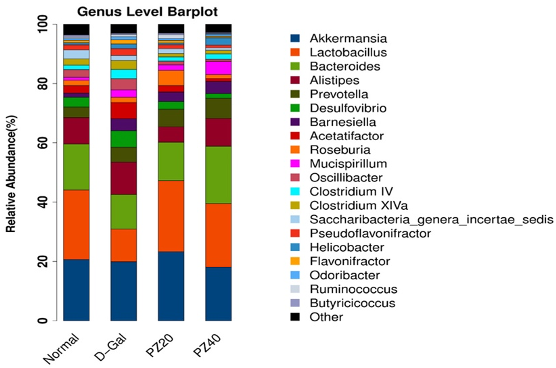Key Points:
- The plant-based compound phlorizin – found in foods like almonds, apples, and strawberries – increases antioxidant defenses, reduces inflammation, and prevents brain cell death in aged mice.
- Memory and cognitive abilities are improved by phlorizin treatment.
- Phlorizin-induced changes in gut bacteria are associated with improved antioxidant defenses and reduced cell death.
When it comes to slowing down the aging process, the balance between oxidants and antioxidants becomes critical. When the balance gets tipped towards oxidants over antioxidants, cells experience oxidative stress, which can lead to cell damage.
Chen and colleagues from Jilin Agricultural University in China report that an antioxidant found in fruits and nuts called phlorizin alleviates the aging process in association with changes in gut bacteria. Published in the journal Experimental Gerontology, this research shows that in aged mice phlorizin increases antioxidant activity, reduces inflammation, and decreases neuronal death. Phlorizin also improves the learning and memory of aged mice. These anti-aging benefits correlate with changes in specific gut bacteria genera, including Lactobacillus.
The Neuroprotective Effects of Phlorizin
To investigate the effects of phlorizin on aging, Chen and colleagues injected phlorizin into the stomachs of aged mice. Phlorizin restored deficits in important antioxidants enzymes (sodium oxide dismutase and catalase), reduced pro-inflammatory proteins, and decreased the proportion of cell death in the brains of the aged mice, demonstrating the protective effect of phlorizin on the brain. Treatment with phlorizin also reduced deficits in learning and memory, perhaps the most devastating clinical symptoms of aging.

(Chen et al., 2022 | Experimental Gerontology) Phlorizin Improves Memory and Learning Deficits of Aged Mice. Aged mice were taught to find food placed in an 8-arm maze. A pellet of food was placed into the first, third, fifth, and seventh arms. (A) The total time (TT) – the time required to find all the pellets, (B) working memory errors (WME) – the number of times the mouse went back into an arm where they already found food, and (C) reference memory errors (RME) – the number of times the mouse went into an arm where there was no food – was increased by 262%, 492%, and 854%, respectively in aged (D-Gal) mice. Treatment with 20 mg/kg (PZ20) or 40 mg/kg (PZ40) of phlorizin reduced these deficits. (D) Trajectory of mice inside the maze.
Phlorizin Breeds Good Bacteria
Studies have revealed that aging is linked to changes in gut microbes (bacteria and other microorganisms living in our gastrointestinal tract). Aging is also intricately connected to inflammation. Gut microbes secrete waste products that can have negative or positive effects on our physiology, depending on the type of microbe. For example, the metabolites of some microbes can be pro-inflammatory and the metabolites of other microbes can be anti-inflammatory. In turn, this increase or decrease in inflammation can either accelerate or decelerate aging.
Chen and colleagues found that the relative abundance of the microbes changed in aged mice but improved after phlorizin treatment. For example, Akkermansia and Lactobacillus, which have both been shown to have anti-aging effects, were improved by phlorizin. The researchers also analyzed the relationship between gut microbes and features of aging. They found that antioxidant activity, inflammation, and neuronal death were correlated with different gut microbes. Thus, it is possible that metabolites from these gut microbes directly or indirectly assist in exerting the anti-aging effects of phlorizin.

Maintaining Healthy Gut Microbes for Youth
Overall, Chen and colleagues show that phlorizin alters gut microbes in aged mice, which is linked to reduced symptoms of aging. This adds to previous studies suggesting the beneficial effects of changing our gut microbes on aging. The metabolites secreted from our gut microbes, including urolithin A can affect our physiology, and thus how quickly we age. In addition to the genera of bacteria mentioned in this study, specific species of bacteria like B. adolescentis could also slow down aging. While studies like these are the reason for the probiotics marketing explosion, maintaining a healthy gut microbiome seems to be an important component of staying young.
Phlorizin is a polyphenol – a family of micronutrients well-known as a rich source of antioxidants – that exists mainly in Rosaceae plants, which includes roses, as well as edibles like apples, strawberries, and almonds. Phlorizin has attracted the attention of the scientific community due to its many biological properties, such as its glucose-lowering and anti-obesity properties. Furthermore, its antioxidant and anti-inflammatory properties protect against kidney injury and cognitive impairment. Therefore, the naturally occurring phlorizin has therapeutic potential. “It is imperative to develop natural and non-toxic drugs that have a high-efficiency antioxidant capacity and can improve cell viability while reducing cell damage,” say the authors.